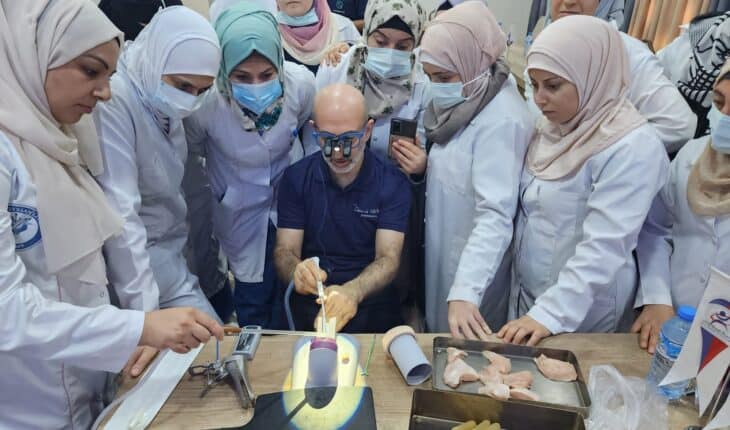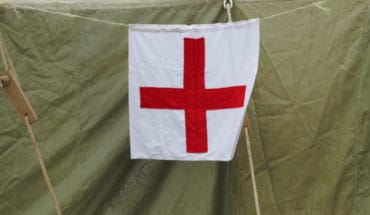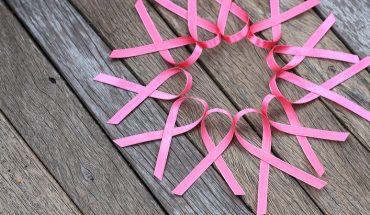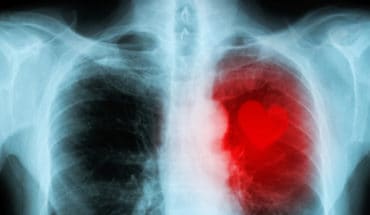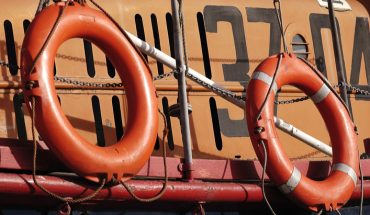Syria remains engulfed in a complex humanitarian crisis. Over a decade of conflict has forced more than 12 million people to flee their homes and left displaced communities with reduced access to food, shelter and protection.
Cancer under the radar
Due to a buckling healthcare system and greater focus on other urgent needs, many are not seeking or receiving the cancer screening, diagnosis or treatments they need. Medical professionals also face challenges with transferring patients over the border to Turkey, which means cancer patient numbers in-country are growing.
Cervical cancer is preventable and curable, as long as it is detected early and managed effectively. According to the World Health Organisation (WHO), it is the 4th most common form of cancer among women worldwide.
Our faculty trainer, Dr Saladin Sawan, travelled to Idlib to upskill Syrian surgeons to offer the best possible surgical care for patients with gynaecological cancers including cervical cancer.
“During my mission, I delivered gynaecology training to a group of doctors. Every day, we practiced surgical techniques. We used chicken thighs and a cutting-edge mannequin, provided by the David Nott Foundation, to practice performing cervical smears, colposcopies to assess the cervix for cancer or pre-cancer changes, and diagnostic punch biopsy, in addition to safely performing treatments for pre-cancer cell changes, in the form of loop excision (using heat to remove cells). Each doctor had hands-on practice and then we put skills to the test in operations.”

Dr Sawan trained 41 local doctors during the mission, which will improve cancer patient care while strengthening northwest Syria’s healthcare system in the long-term.
“I performed approximately 14 surgeries of different magnitude, some small procedures, some far more complex, for example radical hysterectomies for cervical cancer patients and debulking surgery for women with ovarian cancer. We used operations as teaching opportunities for local doctors – residents were assisting me and watching over my shoulder. We trained anywhere between three and seven obstetrics and gynaecology residents per day. Some doctors followed me, but I made it my goal to visit as many hospitals as I could to deliver training to those who could not travel. I was very happy.
I felt appreciated amongst a family of doctors and health professionals who looked after each other to deliver the best they could for their patients in some of the most difficult circumstances. I was certainly privileged to have had the chance to be with them.”
Eliminating cervical cancer
Due to ongoing conflict and accessibility issues, doctors in northwest Syria have limited access to training. The province also lacks a screening programme for cervical cancer prevention and early detection, leading to increased numbers of cases that require complex, radical surgery.
“WHO launched an Elimination of Cervical Cancer Elimination Initiative, which mainly targets low-income countries. The local doctors are really excited about establishing this program for women in Syria. They know the benefit, they believe in its value and importantly they feel it is only right to do since women disproportionately suffer the results of human papilloma virus infection which causes cervical cancer, unlike men. This would promote healthcare equity.”
In his training, Dr Sawan actively encouraged the local doctors not to fear making mistakes.
“Doctors become more confident and patients as a result will be safer. We strive for the doctors to test, try, play, make mistakes. The intention is that the doctors are more competent by the time they perform the operation on patients.
I am lucky to be part of the David Nott Foundation where the emphasis is also on building local expertise and sustainable care by training local health professionals in crisis areas. The donated equipment and surgical instruments meant I was able to deliver comprehensive training without compromises.”

Glimmers of peace
“Around me in Idlib, despite being in a region struck by war, there were people trying to rebuild their lives. Developing roads, restaurants opening, people moving into the city. People have started to live their lives – the dust of war settling and communities trying to get their lives back.”
Since Dr Sawan’s mission and apparent signs of a healing community, the Regime has targeted 45 cities and towns in four days, killing 52 and injuring over 240, according to an October recent report led by Assistance Coordination and Information Management Units (ACU, UMI). Despite glimmers of hope, northwest Syria remains in the thralls of conflict.
What’s next?
As unrest continues, the need for training and sharing of knowledge remains. We are committed to upskilling even more obstetric and paediatric residents in northwest Syria, but there’s much more to do.
“Outside of returning to deliver more surgical training, we also want to deliver dedicated cervical cancer screening training to residents,” shares Dr Sawan.
On-the-ground partners have also identified other, urgent areas of need.
“A local humanitarian organisation, the White Helmets, are looking to develop training for paramedics, including resuscitation and emergency obstetrics, gynaecology and neonate training. To make sure we provide the right training material for paramedics, we want to speak to them to understand exactly what their needs are in the field.”
We’ll continue to do all we can to support medical professionals in Syria.
- Ukraine: the significant challenges of the present and what the next decade will hold - 13th February 2025
- Funding a Palestinian doctor for paediatric trauma training - 3rd February 2025
- Addressing the crisis in conflict healthcare - 6th October 2024
